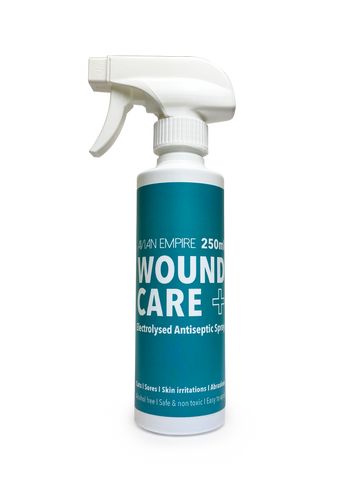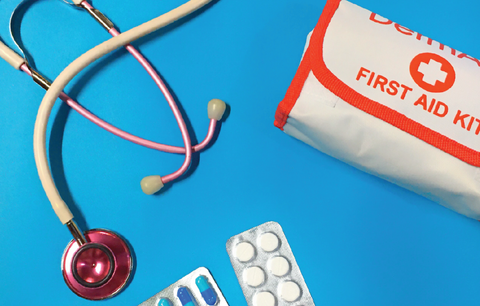
Hypochlorous acid for wound healing.
Share
Hypochlorous acid (HOCl) has been gaining attention for its potential wound healing properties. HOCl is a naturally occurring substance produced by our immune cells to combat pathogens and aid in wound healing. It has been studied for its antimicrobial, anti-inflammatory, and tissue-healing properties.
Hypochlorous acid (HOCl) is a naturally occurring substance found in the body as part of the immune response system. It is produced by certain types of immune cells, particularly neutrophils, which are white blood cells responsible for combating infections. Here's an overview of where HOCl is found in the body and its functions:

- Neutrophils: Neutrophils are a type of white blood cell that plays a crucial role in the body's defense against pathogens. When neutrophils encounter pathogens, they undergo a process called the respiratory burst, during which they produce HOCl as a potent antimicrobial agent. HOCl helps neutralize and destroy invading microorganisms, including bacteria, viruses, and fungi.
- Immune System: HOCl is an essential component of the innate immune response, which provides immediate defense against infections. It acts as a potent oxidant, capable of damaging the cell membranes and genetic material of pathogens. HOCl also helps modulate the immune response, regulating the balance between inflammation and healing.
- Wound Healing: HOCl is involved in the wound healing process. When tissue is damaged, neutrophils migrate to the site of injury and release HOCl to kill invading microorganisms. It also helps to break down damaged tissue, remove debris, and promote the clearance of dead cells, allowing for the subsequent stages of healing to occur.
- Antimicrobial Action: One of the primary functions of HOCl is its antimicrobial action. It is highly effective at killing a broad spectrum of microorganisms, including bacteria, viruses, and fungi. HOCl's ability to target pathogens while being less harmful to host cells is an important aspect of the immune response.
Overall, hypochlorous acid plays a crucial role in the body's defence against infections and wound healing. Its antimicrobial properties help to neutralize pathogens, while its presence helps to regulate the immune response and promote healing. Research is ongoing to explore the potential therapeutic applications of HOCl in various medical fields, including wound care, dermatology, and disinfection
Here is an overview of how HOCl can be used to assist in wound healing:
- Antimicrobial Effects: HOCl has powerful antimicrobial properties, effectively killing bacteria, viruses, and fungi without harming healthy tissue. By reducing the microbial load in a wound, it helps create a clean environment that supports healing and prevents infection.
- Reduction of Biofilm Formation: Biofilms are communities of microorganisms that can form on wound surfaces, hindering the healing process. HOCl has been shown to disrupt biofilms, preventing their formation or aiding in their removal, thus promoting wound healing.
- Anti-inflammatory Properties: Inflammation is a natural response to injury, but excessive or prolonged inflammation can impede wound healing. HOCl has demonstrated anti-inflammatory effects, helping to modulate the inflammatory response and promote a balanced healing environment.
- Stimulation of Cell Migration and Proliferation: HOCl has been shown to promote the migration of healthy cells to the wound site and stimulate the production of new cells, such as fibroblasts, which are important for wound closure and tissue regeneration.
- Safe for Use: HOCl is generally safe for use on wounds. It is non-toxic, non-irritating, and does not damage healthy tissue. Its pH is close to that of the skin, making it well-tolerated.

It's important to note that while HOCl shows promise in wound healing, more research is needed to fully understand its optimal use and effectiveness. Additionally, individual responses to HOCl may vary, and some wounds may require other forms of treatment or medical intervention.
If you are considering using HOCl for wound healing, it is advisable to consult with a veterinary or healthcare professional, such as a wound care specialist or dermatologist. They can assess the specific wound and recommend the most suitable treatment plan to promote optimal healing.
Want to get a hypochlorous acid product for your first aid kit? Get your Wound Care + here
By Sam Hurley

